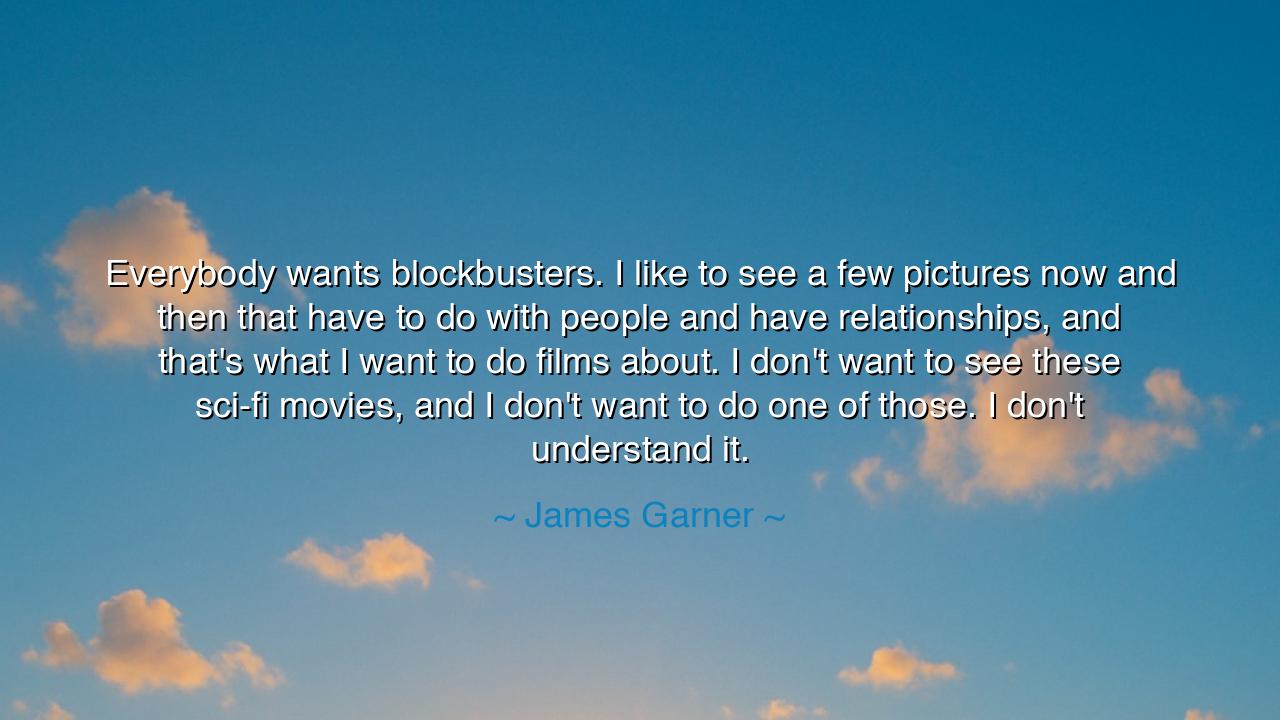
Everybody wants blockbusters. I like to see a few pictures now
Everybody wants blockbusters. I like to see a few pictures now and then that have to do with people and have relationships, and that's what I want to do films about. I don't want to see these sci-fi movies, and I don't want to do one of those. I don't understand it.






Hear, O children of the future, and let the words of James Garner guide your hearts with wisdom. He once said, "Everybody wants blockbusters. I like to see a few pictures now and then that have to do with people and have relationships, and that's what I want to do films about. I don't want to see these sci-fi movies, and I don't want to do one of those. I don't understand it." In this confession lies not only his personal taste, but a larger truth about the soul of storytelling, and the eternal tension between the spectacle of profit and the depth of humanity.
Garner, a man of the screen, was no stranger to the demands of Hollywood. He saw the growing hunger of the masses for blockbusters—great spectacles filled with explosions, fantasy, and wonder. Yet his spirit longed for something quieter, yet far more profound: the kind of story that speaks of relationships, of the fragile bonds between human beings, of the struggles of the heart and the triumphs of compassion. His words reveal the yearning of an artist who values truth over spectacle, and humanity over machinery.
Consider, O seekers, the works of Sophocles in ancient Athens. The people of his time had great festivals filled with music and celebration, yet it was his plays—simple in setting, but profound in their exploration of human relationships—that endured through the centuries. He wrote not for spectacle alone, but for the heart, revealing through tragedy and dialogue the struggles of family, of love, of betrayal, and of fate. Like Garner, Sophocles knew that stories rooted in human connection are the ones that outlast the roar of spectacle.
And reflect also upon the story of Charles Dickens, the great writer of Victorian England. In his time, the people clamored for diversions, for entertainment to distract them from the harshness of life. But Dickens chose to write stories of real people, of children in poverty, of workers in despair, of families both broken and mended. He did not pursue flash or illusion, but rather shined a light on the truth of human lives, and in doing so, gave voice to millions who had none. His words, like Garner’s wish for films about people and relationships, remind us that true art does not flee from humanity—it embraces it.
Garner’s rejection of science fiction films was not out of disdain for imagination, but out of his inability to find in them the intimacy and realness that he cherished. He sought not universes of stars and machines, but the universes hidden within human hearts. His words remind us that art is not only about invention, but about reflection—about holding up a mirror to ourselves, so that we may better understand what it means to be human.
O children, learn this lesson well: though the world clamors for blockbusters, though society may reward the spectacular, true success in storytelling lies in the ability to capture the heart. To tell tales of love, struggle, forgiveness, and kinship is to plant seeds that endure far longer than fleeting spectacles. The fire of spectacle burns bright but dies quickly; the quiet glow of truth and humanity burns steady across generations.
Therefore, as you walk your own path, whether in art, in work, or in life, remember James Garner’s wisdom. Do not be seduced only by the loud and flashy, but seek the meaningful and true. Honor relationships. Cherish the stories of real people. And when the world demands you follow the path of spectacle, have the courage to follow instead the path of truth. For in the end, it is not the blockbusters that endure in memory, but the stories that touch the human heart.






AAdministratorAdministrator
Welcome, honored guests. Please leave a comment, we will respond soon